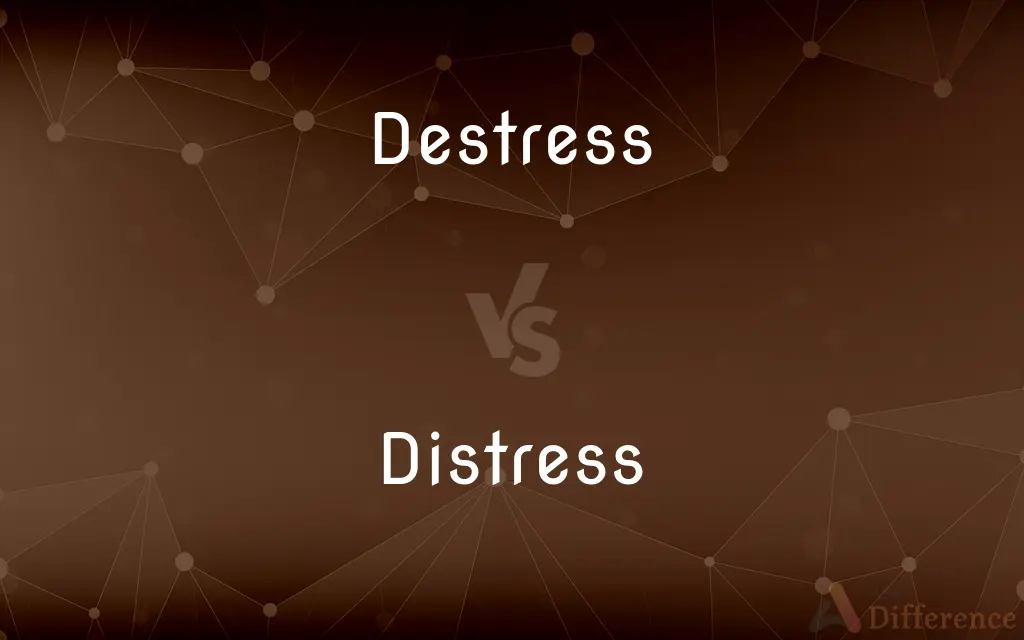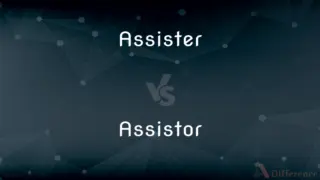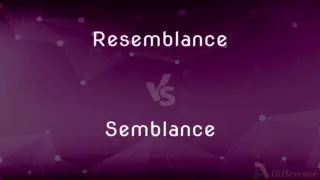Destress vs. Distress — What's the Difference?
By Fiza Rafique & Urooj Arif — Updated on March 21, 2024
Destress refers to the reduction of stress and tension, while distress is extreme anxiety, sorrow, or pain.

Difference Between Destress and Distress
Table of Contents
ADVERTISEMENT
Key Differences
Destressing involves activities or practices aimed at reducing stress levels and promoting relaxation, such as meditation, exercise, or hobbies. On the other hand, distress represents a negative emotional state caused by stress, often leading to discomfort or even health problems, requiring different coping mechanisms or professional help.
While destressing is a proactive and often positive approach to managing one's mental and physical well-being, distress can be a reactive state, signaling when one's coping mechanisms are overwhelmed. Destress methods are typically sought voluntarily to maintain or improve health, whereas distress may necessitate intervention.
Methods to destress, like yoga or deep breathing, focus on calming the mind and body, enhancing overall well-being. Conversely, addressing distress might involve therapeutic interventions, such as counseling or medication, aimed at resolving the underlying causes of stress.
The goal of destressing is to create a balance in life, reducing stressors and enhancing one's ability to handle stress. Distress, however, indicates a lack of balance, where stressors exceed an individual's resources to cope, potentially leading to more serious health issues.
Practices to destress contribute to long-term health benefits, including reduced risk of chronic diseases, improved mental health, and better quality of life. In contrast, prolonged distress without effective management can lead to chronic health conditions, such as heart disease, depression, and anxiety disorders.
ADVERTISEMENT
Comparison Chart
Definition
The reduction of stress and tension.
Extreme anxiety, sorrow, or pain.
Approach
Proactive and positive.
Reactive and often negative.
Methods
Meditation, exercise, hobbies.
Counseling, medication, coping strategies.
Goal
To improve well-being and reduce stress.
To manage and resolve overwhelming stress.
Health Impact
Can improve mental and physical health.
Can lead to chronic mental and physical issues.
Compare with Definitions
Destress
Aimed at improving mental and physical well-being.
She practices yoga regularly to destress and maintain her health.
Distress
May require professional help or therapy.
He sought counseling to cope with his distress.
Destress
Leads to better health, mood, and productivity.
Taking time to destress helps improve his focus at work.
Distress
A state of extreme anxiety, sorrow, or pain.
The sudden loss of her job caused her great distress.
Destress
The act of reducing stress through various methods.
To destress after work, he went for a long run in the park.
Distress
Can lead to health issues if not addressed.
Chronic distress can increase the risk of heart disease.
Destress
Involves activities that promote relaxation and happiness.
Reading a book is a great way to destress.
Distress
Often results from overwhelming stressors.
Financial problems are a common cause of distress.
Destress
Often a personal or preventive measure.
She chose to destress by disconnecting from social media for a week.
Distress
Reactive to adverse situations or overwhelming stress.
The natural disaster left the community in distress.
Destress
To relieve one's stress or tension; relax
"After days like that, she'd go home and de-stress by playing video games" (Kristin Henderson).
Distress
Extreme anxiety, sorrow, or pain
To his distress he saw that she was trembling
Her fingers flew to her throat in distress
Destress
(transitive) To reduce the stresses in a material.
Distress
Another term for distraint
Destress
(ambitransitive) To reduce the stress in oneself or another person.
Distress
Cause (someone) anxiety, sorrow, or pain
I didn't mean to distress you
Please don't distress yourself
Destress
(transitive) To reduce emphasis.
Distress
Give (furniture or clothing) simulated marks of age and wear
The manner in which leather jackets are industrially distressed
Destress
Reduce the emphasis
Distress
To cause strain, anxiety, or suffering to.
Distress
To mar or otherwise treat (an object or fabric, for example) to give the appearance of an antique or of heavy prior use.
Distress
(Archaic) To constrain or overcome by harassment.
Distress
Anxiety or mental suffering.
Distress
Bodily dysfunction or discomfort caused by disease or injury
Respiratory distress.
Distress
Physical deterioration, as of a highway, caused by hard use over time
Pavement distress.
Distress
The condition of being in need of immediate assistance
A motorist in distress.
Distress
Suffering caused by poverty
Programs to relieve public distress.
Distress
(Law) The act of distraining or seizing goods to compel payment or other satisfaction for a debt or other duty owed; distraint.
Distress
Physical or emotional discomfort, suffering, or alarm, particularly of a more acute nature.
Distress
A cause of such discomfort.
Distress
Serious danger.
Distress
(medicine) An aversive state of stress to which a person cannot fully adapt.
Distress
(legal) A seizing of property without legal process to force payment of a debt.
Distress
(legal) The thing taken by distraining; that which is seized to procure satisfaction.
Distress
To cause strain or anxiety to someone.
Distress
(legal) To retain someone’s property against the payment of a debt; to distrain.
Distress
To treat a new object to give it an appearance of age.
A pair of distressed jeans
She distressed the new media cabinet so that it fit with the other furniture in the room.
Distress
Extreme pain or suffering; anguish of body or mind; as, to suffer distress from the gout, or from the loss of friends.
Not fearing death nor shrinking for distress.
Distress
That which occasions suffering; painful situation; misfortune; affliction; misery.
Affliction's sons are brothers in distress.
Distress
A state of danger or necessity; as, a ship in distress, from leaking, loss of spars, want of provisions or water, etc.
Distress
The act of distraining; the taking of a personal chattel out of the possession of a wrongdoer, by way of pledge for redress of an injury, or for the performance of a duty, as for nonpayment of rent or taxes, or for injury done by cattle, etc.
If he were not paid, he would straight go and take a distress of goods and cattle.
The distress thus taken must be proportioned to the thing distrained for.
Distress
To cause pain or anguish to; to pain; to oppress with calamity; to afflict; to harass; to make miserable.
We are troubled on every side, yet not distressed.
Distress
To compel by pain or suffering.
Men who can neither be distressed nor won into a sacrifice of duty.
Distress
To seize for debt; to distrain.
Distress
Psychological suffering;
The death of his wife caused him great distress
Distress
A state of adversity (danger or affliction or need);
A ship in distress
She was the classic maiden in distress
Distress
Extreme physical pain;
The patient appeared to be in distress
Distress
The seizure and holding of property as security for payment of a debt or satisfaction of a claim;
Originally distress was a landloard's remedy against a tenant for unpaid rents or property damage but now the landlord is given a landlord's lien
Distress
Cause mental pain to;
The news of her child's illness distressed the mother
Common Curiosities
What causes a person to experience distress?
Distress is often caused by overwhelming stressors or adverse life events that exceed one's ability to cope.
How can one effectively destress?
Effective destressing methods include relaxation techniques, physical activity, hobbies, and social support.
Are there any natural remedies for distress?
Natural remedies for distress include herbal supplements, aromatherapy, and dietary changes, though professional advice should be sought.
Can destressing improve productivity?
Yes, destressing can clear the mind, improve focus, and enhance productivity by reducing stress-related distractions.
Is distress always a negative experience?
While distress is generally negative and associated with discomfort, it can also be a catalyst for seeking help or making positive life changes.
Can destressing techniques help with distress?
Yes, destressing techniques can help manage distress by improving coping mechanisms and reducing overall stress levels.
What are the signs of distress?
Signs of distress include anxiety, depression, irritability, difficulty sleeping, and physical symptoms such as headaches or stomach issues.
How does distress affect one's health?
Prolonged distress can lead to chronic health conditions, including mental health disorders, cardiovascular diseases, and weakened immune system.
Why is it important to destress regularly?
Regularly destressing helps maintain mental and physical health, preventing the buildup of stress and reducing the risk of distress.
What professional help is available for distress?
Counseling, therapy, medication, and support groups are available for managing distress and its underlying causes.
How do lifestyle changes contribute to managing distress?
Lifestyle changes, such as improved diet, regular exercise, and adequate sleep, can strengthen the body's resilience to stress and reduce distress.
How does social support impact distress?
Strong social support can buffer against distress by providing emotional, informational, and practical assistance.
Can physical activity reduce distress?
Yes, physical activity is an effective way to reduce distress by releasing endorphins and reducing stress hormones.
Is it possible to eliminate distress entirely?
While it may not be possible to eliminate distress entirely, effective management and coping strategies can significantly reduce its impact.
What role does mindfulness play in destressing?
Mindfulness practices can enhance destressing by focusing attention on the present moment, reducing rumination and worry.
Share Your Discovery

Previous Comparison
Assister vs. Assistor
Next Comparison
Resemblance vs. SemblanceAuthor Spotlight
Written by
Fiza RafiqueFiza Rafique is a skilled content writer at AskDifference.com, where she meticulously refines and enhances written pieces. Drawing from her vast editorial expertise, Fiza ensures clarity, accuracy, and precision in every article. Passionate about language, she continually seeks to elevate the quality of content for readers worldwide.
Co-written by
Urooj ArifUrooj is a skilled content writer at Ask Difference, known for her exceptional ability to simplify complex topics into engaging and informative content. With a passion for research and a flair for clear, concise writing, she consistently delivers articles that resonate with our diverse audience.
















































